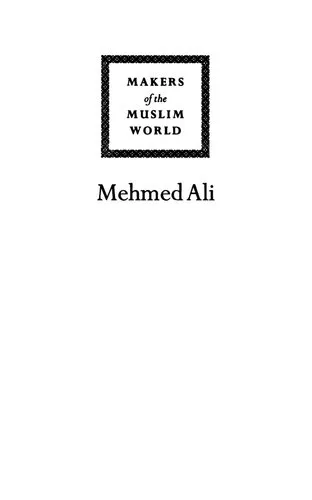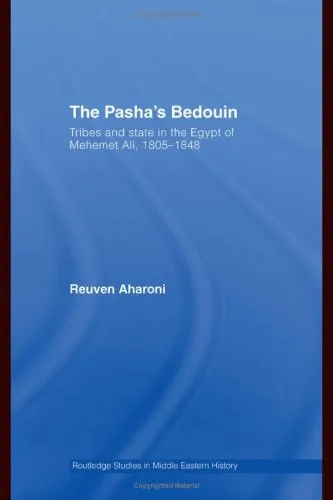Mehmed Ali: From Ottoman Governor to Ruler of Egypt
4.5
Reviews from our users

You Can Ask your questions from this book's AI after Login
Each download or ask from book AI costs 2 points. To earn more free points, please visit the Points Guide Page and complete some valuable actions.Related Refrences:
Introduction to "Mehmed Ali: From Ottoman Governor to Ruler of Egypt"
"Mehmed Ali: From Ottoman Governor to Ruler of Egypt" is a riveting examination of one of the most powerful figures in Middle Eastern history, a man who rose from obscurity to dominate Egypt and reshape the dynamics of the Ottoman Empire during the early 19th century. Written with precision and backed by extensive research, this book delves deep into Mehmed Ali's life, ambitions, and his impact on the region he sought to control and modernize.
The book is an exploration of Mehmed Ali's transition from an Ottoman governor to a dynamic and independent ruler of Egypt, tracing the political, social, and economic changes he implemented during his reign. It is essential reading for students of Middle Eastern history, political science, and anyone interested in understanding transformative leadership during a time when empires were grappling with internal reform and external pressures.
Detailed Summary of the Book
"Mehmed Ali: From Ottoman Governor to Ruler of Egypt" chronicles Mehmed Ali's ascension from humble beginnings as an Albanian soldier in the Ottoman army to becoming the ruler of Egypt, arguably the most important and strategic region of the Ottoman Empire. Divided into carefully organized chapters, the book follows Mehmed Ali's journey starting from his arrival in Egypt in 1801 as part of the Ottoman forces aiming to expel Napoleon's expedition.
The book highlights his tactical genius, which allowed him to consolidate power in Egypt by eliminating rivals and establishing a centralized government. Key developments include Mehmed Ali’s agricultural reforms, military restructuring, and his ambitious economic policies aimed at modernizing Egypt’s infrastructure. The narrative also addresses his conflicts with the Ottoman Empire, his wars in Arabia, Sudan, Greece, and Syria, as well as his eventual confrontation with European powers.
Throughout the book, Mehmed Ali emerges not only as an ambitious and often ruthless leader but also as a reformer who attempted to balance modernization with his own authoritarian control. While the reforms he introduced laid the groundwork for many of Egypt's modern institutions, the book also critiques the exploitative nature of some of his strategies, particularly relating to forced labor and monopolistic economic practices.
Key Takeaways
- Mehmed Ali's governance was pragmatic, blending military strength and administrative innovations.
- He laid the foundations for modernized state institutions, especially in agriculture and education.
- His rise emphasized the complexities of Ottoman imperial power during the 19th century.
- Despite his reforms, many criticized his rule for its authoritarian nature and reliance on forced labor.
- Mehmed Ali's legacy still shapes discussions on modern statecraft in the Middle East.
Famous Quotes from the Book
"Mehmed Ali exemplified a leader who, through sheer ambition and strategic genius, sought not only to command Egypt but to redefine its place in the world."
"The transformations initiated by Mehmed Ali were not merely about acquiring power, but about constructing a vision of control that blended reform with exploitation."
Why This Book Matters
In an era where global power dynamics are continually shifting, understanding the life and strategies of Mehmed Ali provides a fascinating case study in leadership, reform, and state-building. This book matters because it challenges readers to think critically about how leaders consolidate power, the balance between modernization and authoritarianism, and the legacy of such figures within their societies.
For students, scholars, and historians, the book offers unprecedented insights into Mehmed Ali’s unique position as both a reformer and a ruler. For casual readers, it sheds light on an era less known in the West but pivotal in shaping the modern Middle East. Overall, this work proves to be more than just a biography—it is a window into the political and social complexities of 19th-century Egypt and its position within the Ottoman Empire.
"Mehmed Ali: From Ottoman Governor to Ruler of Egypt" is not simply history; it is a narrative of ambition, resilience, and the intricate dance between tradition and reform. Whether you are a seasoned historian or a curious learner, this book will leave you with a heightened understanding of Mehmed Ali's enduring significance.
Free Direct Download
Get Free Access to Download this and other Thousands of Books (Join Now)
For read this book you need PDF Reader Software like Foxit Reader



